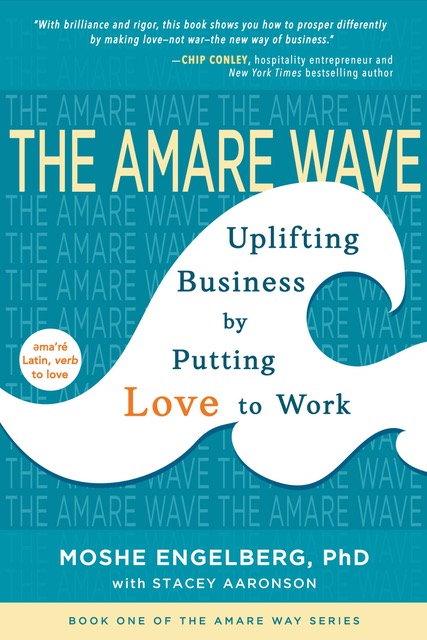If you’ve been in the work world for a while, you’re almost certain to have experienced the “business is war” mentality, simply because, as we’ve already discussed, it’s a paradigm we’ve been immersed in for a long, long time in modern society. As a result, you may very well know what it takes to succeed in a “business is war” world. It may have even made you rich.
Yet, despite our successes, many of us are tired of operating in this way. We don’t want to do business is war anymore, even if it can make us a lot of money. We’ve seen how it causes too much suffering, personally and societally, and how it makes us compromise our values and be untrue to ourselves. Perhaps worst of all, it takes away some of our humanity and our connection to the greater whole.
The bottom line? Deep down, we know business can be better, and still be highly profitable. It’s the dueling motivations of fear and love that trip us up.
FEAR ENERGY VS. LOVE ENERGY
The best way to think about these two energies is not to go within the mind, as we so often do when striving to understand a concept, but rather within the body. This is because the energy of both fear and love is felt as heightened physiological arousal. With love—whether in personal situations or at work—our bodies actually feel expanded when we are filled with this energy, giving us a sense of alignment with our true selves. Fear—whether from real danger or the anticipation of bad things happening—also directly affects the body, only in a way that makes us feel constricted. This type of energy pulls us out of alignment with our true selves and our higher good, thereby diminishing us.
You can think of the energies of love and fear as differing in terms of their frequency and vibration. While this may sound like “woo woo” language, the idea that everything is energy and expressed in frequency and vibration is actually a central tenet of quantum physics. Engineer and physicist Nikola Tesla famously said:
“If you want to know the secrets of the universe, think in terms of energy, frequency, and vibration.”
This is where physics and new-age thinking join hands: love vibrates at a high frequency, and fear vibrates at a low frequency. As human beings, we sense and respond differently to love and fear vibrations, even if we don’t know how we do it and science cannot yet fully explain it.
Have you, for example, ever had a sudden and strong reaction that you couldn’t logically explain when meeting someone new? That’s you tuning into and reacting to that person’s energy, or their vibrational frequency.
It’s fascinating that from an evolutionary perspective—as our brains have grown and our prefrontal cortex has evolved to give us greater cognitive power and language—our ability to understand and choose the energy of love has increased. It makes sense that exercising our propensity for love demonstrates our more noble and evolved selves, as well as our natural state of being. But on the flip side of that is fear, which elicits our fight/flight/freeze response, involving our more primitive lower brain stem. It’s no surprise that when we exercise this survival mechanism, one rarely needed in the modern world, we show our more primitive selves.
While we all have the unique capacity for both love and fear, consider for a moment what I said about the energy of love being expansive, and the energy of fear being constricting. Now imagine, for example, in what state employees are likely to fully engage, contribute new ideas, and put forward their best work. The answer, I believe, is obvious.
When we are afraid, we pull back from life. When we are in love, we open to all that life has to offer with passion, excitement, and acceptance.
— JOHN LENNON
Here’s what choosing love over fear looks like in relation to business:
• You aim to uplift, not to intimidate. You know how to win in business with the intention of elevating yourself and others without fighting with or diminishing others.
• You make it a point to use love-like language to inspire your people, and you avoid amping up your team with warlike fighting language to squeeze suppliers, crush competitors, and control customers.
• You know there is enough to go around and have faith that life conspires to support us all, hence you realize greed and arrogance have no place in your business or life.
• You show up whole—without fear of vulnerability—and not in any way diminishing or hiding from your own power. You are not afraid to shine, or to allow others to shine, because you know everyone deserves to realize and contribute their gifts toward the greater good of the company.
• You sincerely want similar companies—who are also love-centered and ethical—to succeed, recognizing that when we all serve our common audience well, everybody wins.
Both love and fear can be linked to productivity gains in business under certain conditions, but Amare Way companies recognize that gains motivated by fear are short term and come at a significant cost. Over time, fear diminishes performance, as it erodes trust and physiologically wears people down. On the flip side, in the long term, love works better. And at the end of the day, love feels better than fear. Being love-centered is how you treat each other well, how you generate interconnection, and how you stay attuned to the company’s higher purpose.

Excerpt from The Amare Wave: Uplifting Business by Putting Love to Work
by Moshe Engelberg, Ph.D.
27 years into consulting with world class organizations, Moshe had a simple epiphany: Business was missing love. To remedy that, he wrote The Amare Wave: Uplifting Business by Putting Love to Work(© 2019), from which this article is excerpted. It is a trip!
Follow us here and subscribe here for all the latest news on how you can keep Thriving.
Stay up to date or catch-up on all our podcasts with Arianna Huffington here.


